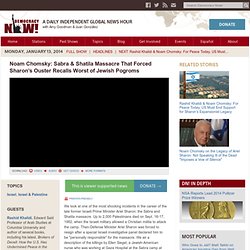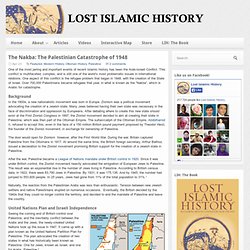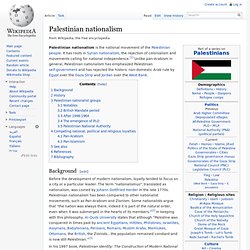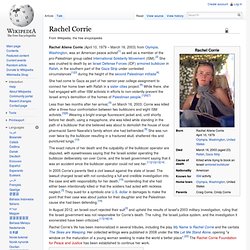

Dr. Mads Gilbert: Solidarity with Gaza! If no siege, no tunnels! - If no occupation, no rockets! Palestinian and Israeli Deaths: Timeline of Violence Since September 2000. Hamas Didn’t Kidnap the Israeli Teens After All. Jews of Khazaria, brief history and other resources - Palestine Remembered. Noam Chomsky: Sabra & Shatila Massacre That Forced Sharon’s Ouster Recalls Worst of Jewish Pogroms. This is a rush transcript.

Copy may not be in its final form. AMY GOODMAN: Avi Shlaim, go back to 1982 and what happened in Lebanon. First, where were you? AVI SHLAIM: In 1982, Ariel Sharon was defense minister in Menachem Begin’s government, and he was the architect of the invasion of Lebanon. And it was a war of deception because Sharon tricked his Cabinet colleagues into launching this operation by pretending the aims were very limited, whereas in fact he had a big plan to completely change the bare geopolitics of the region, to create a new order in Lebanon but by helping Israel’s Maronite Christian allies to come to power in Lebanon and then sign a peace treaty with Israel, then to expel the Syrian forces from Lebanon and to replace Syrian with Israeli hegemony in the Levant. This war of deception ended in tears. NOAM CHOMSKY: Well, the Kahan Commission did condemn Sharon for what they called "indirect responsibility" for Sabra-Shatila massacre.
RASHID KHALIDI: Correct. The Nakba: The Palestinian Catastrophe of 1948. One of the most jarring and important events of recent Islamic history has been the Arab-Israeli Conflict.

This conflict is multifaceted, complex, and is still one of the world’s most problematic issues in international relations. One aspect of this conflict is the refugee problem that began in 1948, with the creation of the State of Israel. Over 700,000 Palestinians became refugees that year, in what is known as the “Nakba”, which is Arabic for catastrophe. Background In the 1800s, a new nationalistic movement was born in Europe. The door would open for Zionism however, after the First World War. After the war, Palestine became a League of Nations mandate under British control in 1920. Naturally, the reaction from the Palestinian Arabs was less than enthusiastic. United Nations Plan and Israeli Independence.
The other side of Israel. Palestinian nationalism. Palestinian nationalism is the national movement of the Palestinian people.

It has roots in Syrian nationalism, the rejection of colonialism and movements calling for national independence.[1] Unlike pan-Arabism in general, Palestinian nationalism has emphasized Palestinian self-government and has rejected the historic non-domestic Arab rule by Egypt over the Gaza Strip and Jordan over the West Bank. Background[edit] Before the development of modern nationalism, loyalty tended to focus on a city or a particular leader. The term "nationalismus", translated as nationalism, was coined by Johann Gottfried Herder in the late 1770s.
Palestinian nationalism has been compared to other nationalist movements, such as Pan-Arabism and Zionism. Israeli historian Haim Gerber, a professor of Islamic History at Hebrew University of Jerusalem, traces Arab nationalism back to a 17th-century religious leader, Mufti Khayr al-Din al-Ramli (1585–1671)[8] who lived in Ramla. History[edit] Notables[edit]
Rachel Corrie. Rachel Aliene Corrie (April 10, 1979 – March 16, 2003) from Olympia, Washington, was an American peace activist[1] as well as a member of the pro-Palestinian group called International Solidarity Movement (ISM).[2] She was crushed to death by an Israel Defense Forces (IDF) armored bulldozer in Rafah, in the southern part of the Gaza Strip under contested circumstances[1][3] during the height of the second Palestinian intifada[4] She had come to Gaza as part of her senior-year college assignment to connect her home town with Rafah in a sister cities project.[5] While there, she had engaged with other ISM activists in efforts to non-violently prevent the Israeli army's demolition of the homes of Palestinian people.[1][6][7] In 2005 Corrie's parents filed a civil lawsuit against the state of Israel.

Rachel Corrie's life has been memorialized in several tributes, including the play My Name Is Rachel Corrie and the cantata The Skies are Weeping. Early life Water well protecting efforts.